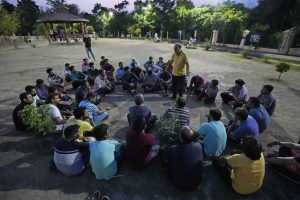On April 20, militants targeted an Indian Army truck in Poonch in the Jammu region of Jammu and Kashmir. Five soldiers were killed. The People’s Anti-Fascist Front (PAFF), an affiliate of the Pakistan-based Jaish-e-Mohammed claimed responsibility for the ambush. It released several photographs of the attack on social media.
The ambush at Poonch reaffirms concerns in India’s security establishment that militancy is being revived in the Jammu region. With the tightened security grid in the Kashmir Valley making it difficult for militants to operate there, the latter are training their sights on the Jammu region.
While locals provided the militants with food and shelter, arms, ammunition and explosives came from Pakistan and were delivered via drones, J&K Director General of Police Dilbagh Singh said.
Poonch is a border district; the site of the attack is just 6-7 km from the Line of Control (LoC), the de facto border between Indian- and Pakistani-administered Kashmir.
“The proximity of the incident site to the LoC, juxtaposed with the type of weapons used, indicate that the attack was carried out by trained and well-armed militants,” Lt Gen (Dr) Prakash Menon (retd), a former military adviser in India’s National Security Council Secretariat, wrote in The Print, adding that “the Pakistani hand in the incident seems unmistakable.”
The timing of the ambush at Poonch is significant. It came soon after Pakistan announced that Foreign Minister Bilawal Bhutto Zardari would attend the Shanghai Cooperation Organization (SCO) Council of Foreign Ministers meeting that India is hosting at Goa on May 4-5. There were hopes that a meeting between India’s Foreign Minister S Jaishankar and Zardari would happen on the sidelines of the Goa meeting.
Was the ambush at Poonch aimed at scuttling a bilateral meeting between the two ministers and thus nipping in the bud any attempt at normalizing relations between the two countries? Such attempts at sabotage of talks and undermining of relations have happened in the past and cannot be ruled out now.
While Zardari will attend the SCO meeting at Goa, a bilateral meeting between the two ministers seems unlikely now. “It is for us very difficult to engage with a neighbor who practices cross-border terrorism against us,” Jaishankar said.
The attack at Poonch happened a month before an important event that India is hosting in Srinagar, J&K’s summer capital. A G-20 Tourism Working Group meeting is scheduled for May 22-24. During its presidency, India is hosting dozens of G-20-related events across the country and the meeting in Srinagar is an important one that is aimed at signaling to the world that all is well in the restive union territory. Consequently, even a small attack here would be a big embarrassment.
Under Prime Minister Narendra Modi, India has adopted a muscular approach towards Kashmir. Since August 2019, when his government abrogated J&K’s autonomy, it has often claimed that its strategy has ended militancy in J&K. The Poonch attack reaffirms what critics of Modi’s Kashmir strategy have been saying for some time: militancy and terrorism in J&K remains alive.
Importantly, the ambush at Poonch adds to a fast-growing list of terror attacks in the Jammu region.
It was the Kashmir Valley that was the epicenter of the militancy in the 1990s. With security forces gaining the upper hand by the middle of that decade, militants shifted focus to Jammu. Several attacks followed, including massacres of Hindus. Unlike the predominantly Muslim Kashmir Valley, Jammu’s population is more mixed.
Most parts of Jammu have been largely militancy free over the past 15 years or so. That began changing in mid-2021.
Security officials say that there is a sustained effort to revive militancy in the Jammu region. There have been several gunfights, gunning down of civilians and blasts in the region, including “mysterious explosions in buses, vehicles and open spaces in the Jammu division.”
On January 1-2 this year, six civilians, all Hindus, were shot dead in Dangri village in Rajouri district in the Jammu region. Like Poonch, Rajouri borders the LoC. The Resistance Front (TRF), a Lashkar-e-Taiba affiliate, claimed responsibility for the mass killing, Both PAFF and TRF emerged in the months after the abrogation of J&K’s autonomy.
The rise in attacks in the Jammu region has revived memories of the horrific violence that militants unleashed on civilians and security forces in the 1990s and 2000s.
For militants, Jammu, with its hilly and thickly forested terrain provides an ideal environment for them to operate. Some of the best routes for infiltration of militants from Pakistan to India lie along the LoC in Jammu.
The Hindu-Muslim mix of the population in Jammu has in the past triggered communal tensions and backlash. The revival of the militancy in Jammu will deepen the challenges India’s security forces face.

































